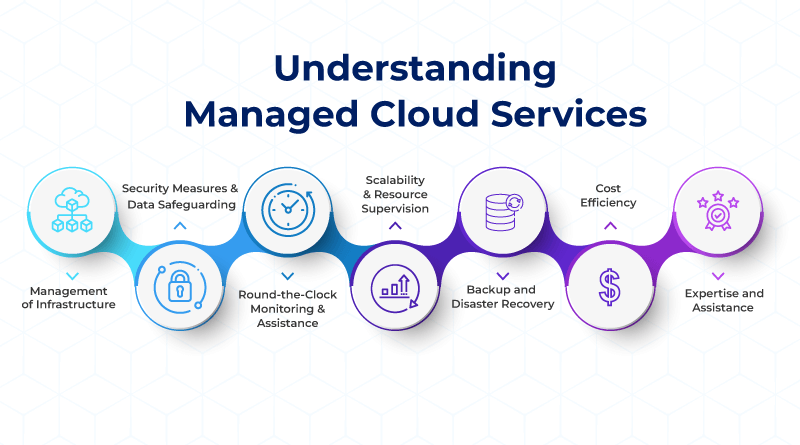Cloud management services have emerged as a critical asset for companies seeking to boost productivity and stimulate growth in the swiftly evolving corporate landscape of today. By establishing a collaboration with a provider specializing in managed cloud services, companies can delegate the intricate aspects of cloud management, allowing them to concentrate on their fundamental strengths.
Enterprises are investing in Cloud First Strategies instead of Cloud Smart. Cloud First means, they want to run everything on cloud. The enterprise has no idea how much does it cost in the long run, and whether it meets with the compliance requirements? Being Cloud Smart means running several critical applications on the premises and other applications on the cloud. Managed cloud services grant enterprises access to IT solutions provided by external parties for supervising their cloud-based services along with technical assistance. These offerings come with a flexible, robust, and cost-effective infrastructure that caters to the distinct requirements of each enterprise.
By employing managed cloud services, companies can enhance operational productivity. This enhancement is possible due to the proficiencies of the service provider, which enables companies to make the most of their IT assets, decrease the pressure on in-house IT departments, and concentrate on key strategic ventures.
Managed cloud hosting also helps you to achieve your BCDR Strategy goals. BCDR stands for Business Continuity Disaster Recovery. A smartly implemented BCDR will help you to reduce RPO (Recovery Point Objective) and RTO (Recovery Time Objective) that ultimately helps in saving cost.
Another major advantage of managed cloud services is scalability. Enterprises have the flexibility to ramp up or scale down their resources as per the need, allowing them to swiftly adapt to fluctuating market scenarios and efficiently manage high-demand periods.
The cost-effectiveness of cheap cloud hosting services is one of its integral attributes, as it enables enterprises to bypass the need for substantial upfront investments in hardware and infrastructure. Instead, companies can opt to pay cloud based server cost for the services they employ based on a subscription model, effectively transforming capital expenditures into operational ones.
Security and regulatory compliance are high-priority areas for providers of managed cloud services. They deploy comprehensive security protocols, firewalls, and encryption methods to safeguard confidential data. Additionally, they guarantee business continuity via redundant systems and strategies for disaster recovery.
Understanding Managed Cloud Services

Managed cloud services equip businesses with a complete package for supervising their cloud-based services and IT framework. When businesses join forces with a provider of managed cloud services, they can delegate the intricate aspects of cloud management and devote their attention to their primary areas of expertise. Let’s explore the fundamental components of managed cloud services:
Management of Infrastructure:
Providers of managed cloud hosting services oversee the establishment, configuration, and upkeep of the infrastructure. This management encompasses servers, storage, networking, and virtualization technologies. By tapping into the infrastructure acumen of the provider, businesses can guarantee the optimal functioning, scalability, and reliability of their cloud environment.
Security Measures and Data Safeguarding:
Providers of managed cloud services deploy comprehensive security measures to secure sensitive data and reduce risks. They enforce state-of-the-art security protocols, firewalls, and systems for detecting intrusions to guard against cyber threats. Practices such as data encryption, access control, and regular security audits are also an integral part of their security protocol. This ensures that businesses can entrust the provider with their data security and stay compliant with industry norms.
Round-the-Clock Monitoring and Assistance:
Providers of managed cloud services offer incessant monitoring and support for the cloud infrastructure. They proactively keep an eye on system performance, swiftly identify and resolve issues, and guarantee optimal uptime. This ensures that businesses can depend on continuous and reliable access to their cloud services.
Scalability and Resource Supervision:
Cheap cloud hosting services grant businesses the capacity to scale their IT resources in line with demand. Whether it’s augmenting storage capacity, bolstering computing power, or expanding network capabilities, the service provider can speedily allot resources to meet business needs. This scalability allows businesses to adapt to changing needs without hefty infrastructure investments.
Backup and Disaster Recovery:
Providers of managed cloud services roll out robust backup and disaster recovery solutions. They regularly backup data to ensure its integrity and provide efficient recovery options in the event of data loss or system failures. This reduces the risk of data loss and enables businesses to recover swiftly and resume operations during unexpected incidents.
Cost Efficiency:
Managed cloud hosting services bring cloud cost optimization benefits for businesses. Rather than making upfront investments in hardware and infrastructure, businesses can utilize the provider’s resources on a subscription model. This eliminates the need for capital expenditure and allows businesses to align costs with usage. Additionally, businesses can evade the expenses associated with maintaining a dedicated in-house IT team for cloud management.
Expertise and Assistance:
Providers of managed cloud services possess deep-seated expertise and specialized knowledge in cloud technologies. They maintain teams of proficient professionals who stay abreast of the latest industry trends, best practices, and emerging technologies. This expertise guarantees that businesses can fully leverage the cloud’s potential and receive expert advice and support throughout their cloud journey.
By forming a partnership with a provider of cheap cloud hosting services, businesses can delegate the complexities of cloud management and harness the provider’s expertise, infrastructure, and support. This enables businesses to concentrate on their core competencies, boost operational efficiency, enhance security, and stimulate innovation.
Related: A Buyer’s Guide to Cloud Managed Services
Cloud Cost Optimization: Efficiency, Scalability, and Cost Savings
Managed cloud services bring substantial benefits in efficiency, scalability, and cost savings to businesses. Here, we examine these facets in greater detail:
Efficiency
Managed cloud services notably enhance operational efficiency. By delegating cloud management to seasoned professionals, businesses can streamline their IT infrastructure and concentrate on their main business activities. This leads to several efficiency benefits:
Proactive Monitoring and Maintenance:
Providers of managed cloud services utilize sophisticated monitoring tools and methods for proactive infrastructure health and performance checks. They promptly identify and rectify issues, thereby minimizing downtime and ensuring smooth operations.
24/7 Support:
Managed cloud service providers offer around-the-clock support, guaranteeing businesses have access to help whenever needed. This eliminates the need to maintain a 24/7 in-house IT team and ensures businesses receive timely assistance for any technical issues or questions.
Expertise and Specialization:
Providers of managed cloud hosting services possess profound expertise in cloud technologies. Their dedicated teams with specialized skills handle various aspects of cloud management, from infrastructure setup, maintenance, security, to updates. Businesses thus benefit from cutting-edge industry best practices and the most efficient cloud resource utilization.
Streamlined Processes:
Managed cloud services automate routine tasks and implement standardized workflows, which refines IT processes. This reduces manual efforts, minimizes errors, and enhances overall operational efficiency. It also enables businesses to scale their operations more effectively without extensive manual intervention.
Scalability
Managed cloud services afford businesses the flexibility to scale their IT resources according to shifting needs. This scalability brings several advantages:
Resource Elasticity:
Businesses can effortlessly adjust their computing resources like storage, processing power, and memory to match demand. Resources can quickly scale up during peak periods to ensure optimal performance. Conversely, during quieter times, resources can scale down, helping businesses avoid unnecessary costs.
Rapid Deployment:
Managed cloud services allow businesses to swiftly deploy new applications and services. The cloud infrastructure and tools provided by the service provider facilitate quick resource provisioning and configuration. This responsiveness allows businesses to react rapidly to market opportunities, launch new products, and stay competitive.
Geographic Expansion:
For businesses looking to broaden their operations into new regions, cheap cloud hosting services offer the scalability required to support such expansion. Service providers typically have a global presence, enabling businesses to deploy their applications and services in multiple geographic locations without setting up physical infrastructure.
Bursting Capabilities:
Managed cloud services often include bursting capabilities, enabling businesses to handle temporary demand spikes. For instance, an e-commerce website experiencing high traffic during a sale can promptly scale up its resources to meet increased demand. Bursting ensures businesses maintain excellent performance levels during peak periods without over-provisioning their resources.
Cost Savings
Compared to traditional on-premises infrastructure, managed cloud services offer considerable cost savings. Here’s how they aid in cost optimization:
Reduced Capital Expenditure:
Managed cloud hosting services eliminate the need for substantial initial capital expenditure on hardware, software licenses, and infrastructure setup. Businesses pay for the services they use on a subscription basis, converting capital expenses into operational expenses.
Lower Maintenance Costs:
With managed cloud services, businesses can evade costs related to maintaining and upgrading their infrastructure. The service provider handles routine maintenance, system updates, and security patches, lessening the internal IT team’s burden and reducing associated costs.
Pay-as-You-Go Model:
Managed cloud services follow a pay-as-you-go model, where businesses pay only for the resources and services they actually use. This flexibility allows businesses to align their costs with actual usage and avoid unnecessary spending on underutilized resources.
Scalable Pricing:
Managed cloud hosting services offer pricing models that can scale up or down based on business needs. Businesses can easily adjust their resource allocation and associated costs, ensuring efficient cost management.
Economies of Scale:
Managed cloud service providers operate on a large scale, sharing their resources among various clients. This allows businesses to benefit from economies of scale, accessing enterprise-level infrastructure, expertise, and support at a fraction of the cost of building and maintaining it internally.
In summary, managed cloud hosting services bring efficiency, scalability, and cost savings to businesses. Leveraging these services, businesses can optimize their IT operations, swiftly scale resources, and align costs with usage. This empowers them to concentrate on their core competencies, react quickly to market changes, and stimulate growth while enjoying the benefits of a flexible and cost-effective cloud infrastructure.
Security, Compliance, and Business Continuity
The pivotal elements to consider when opting for managed cloud services are security, compliance, and business continuity. Let’s delve deeper into these aspects:
Security
Securing data is paramount for businesses, particularly when sensitive information is stored in the cloud. Providers of managed cloud services have potent security measures in place to shield data from unauthorized access, breaches, and cyber threats.
Typical security measures include:
Data Encryption:
Providers of managed cloud services use encryption techniques to safeguard data, both at rest and in transit. This guarantees that even if data is intercepted, it remains indecipherable without the encryption keys.
Access Controls:
Providers enforce rigorous access controls to ensure only authorized individuals have data and resource access. This encompasses multi-factor authentication, role-based access controls, and privileged access management.
Firewalls and Intrusion Detection Systems:
Managed cloud services deploy firewalls and intrusion detection systems (IDS) to scrutinize network traffic and spot any unusual or malicious activity. These security measures aid in defending against unauthorized access and potential breaches.
Regular Security Audits:
Providers of managed cloud hosting services perform regular security audits to uncover vulnerabilities and assure compliance with industry standards and regulations. These audits help to spot any weak points in the security infrastructure and initiate suitable measures to mitigate risks.
Compliance
Businesses across various sectors need to adhere to specific regulations and standards, such as GDPR, HIPAA, or PCI-DSS. Providers of managed cloud services comprehend the compliance requirements and possess the expertise to assist businesses in fulfilling these obligations.
Consider following aspects for compliance
Compliance Frameworks:
Providers maintain well-established compliance frameworks and processes to ensure their infrastructure and services meet the necessary standards. This includes the implementation of required controls and safeguards to protect sensitive data and maintain regulatory compliance.
Data Residency:
For businesses operating in specific regions or industries, data residency requirements may dictate the storage location of the data. Providers of managed cloud services should offer options to ensure data residency compliance while supplying the requisite infrastructure and services.
Data Privacy:
Providers should enforce robust data privacy policies in line with relevant regulations. This includes the proper management and processing of personal data, ensuring consent, and transparency in data collection and usage.
Audits and Certifications:
Providers of managed cloud services often undergo external audits and hold certifications to demonstrate compliance with industry-specific regulations and standards. These audits and certifications provide assurance that the provider adheres to best practices and meets the necessary compliance requirements.
Business Continuity
BCDR – Business Continuity Disaster Recovery makes the organization resilient for cyberattacks. Ensuring business continuity is critical to minimize disruptions and maintain operations, even in the face of unexpected events. Providers of managed cloud services offer robust solutions to mitigate the risk of data loss, downtime, and system failures.
Related: Benefits of Managed Cloud Services
These solutions generally include:
Redundant Infrastructure:
Providers operate redundant infrastructure across geographically diverse locations. This redundancy ensures that even if one data center encounters a failure, the services and data can seamlessly failover to another location, minimizing downtime and ensuring continuity.
Backup and Recovery:
Managed cloud services encompass regular backup and recovery mechanisms to protect data. These backups are typically stored in separate locations to ensure data integrity and facilitate quick recovery in the event of data loss or system failures.
Disaster Recovery Planning:
Providers have exhaustive disaster recovery plans in place to tackle different scenarios. These plans outline the necessary steps and processes to recover systems and data, minimizing the impact of disruptions and ensuring business continuity.
Testing and Validation:
Providers of cheap cloud hosting services regularly test and validate their disaster recovery plans to ensure their effectiveness. This includes conducting drills and simulations to identify any gaps or weaknesses and making necessary adjustments.
Innovation and Future Growth
Managed cloud services go beyond simply enhancing efficiency and cost-effectiveness; they are also instrumental in fueling innovation and facilitating future growth. By capitalizing on cloud-based solutions, businesses can explore emerging technologies such as artificial intelligence (AI), machine learning (ML), and the Internet of Things (IoT). The scalability and adaptability of managed cloud services empower companies to trial and employ new ideas without substantial initial investments.
Cloud-based platforms offer a resilient and scalable infrastructure capable of supporting the deployment and management of AI and ML models. With managed cloud services, businesses can harness the power of AI and ML to extract insights from their data, automate processes, and improve decision-making. From predictive analytics to natural language processing, AI and ML technologies can drive innovation and efficiency across a multitude of industries.
The Internet of Things (IoT) represents another domain where managed cloud services play a pivotal role. IoT devices produce enormous volumes of data that require real-time collection, processing, and analysis. Managed cloud services provide the necessary infrastructure and capabilities to handle IoT data effectively, enabling businesses to extract actionable insights and enhance operational efficiency. Be it smart cities, connected healthcare devices, or industrial IoT applications, managed cloud services offer a scalable and secure platform to manage and extract value from IoT deployments.
Additionally, managed cloud hosting services encourage collaboration and facilitate seamless connectivity between businesses, partners, customers, and employees. Cloud-based collaboration tools, file sharing platforms, and real-time communication systems empower teams to collaborate, irrespective of their geographical locations. This promotes innovation and cultivates a culture of collaboration and knowledge sharing within organizations.
As businesses embrace digital transformation, cloud hosting services evolve into a catalyst for growth. They provide the scalability, flexibility, and technological capabilities necessary to react to market demands, launch new products and services, and penetrate new markets. With managed cloud services, businesses can maintain agility, adapt to fluctuating customer needs, and seize emerging opportunities. In summary, managed cloud services not only deliver operational efficiency and cost savings but also act as a Launchpad for innovation and future growth. By utilizing cloud-based solutions, businesses can leverage the power of AI, ML, IoT, and collaboration tools to drive innovation, boost productivity, and maintain a competitive edge in today’s dynamic landscape.















